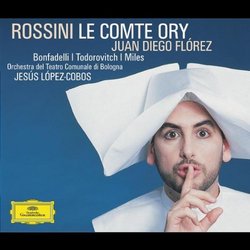| All Artists: Gioachino Rossini, Jesús López-Cobos, Orchestra del Teatro Comunale di Bologna, Juan Diego Flórez, Stefania Bonfadelli, Marie-Ange Todorovitch, Alastair Miles, Marina De Liso, Bruno Praticò, Rossella Bevacqua Title: Rossini - Le Comte Ory (Rossini Opera Festival, Pesaro 2003) Members Wishing: 0 Total Copies: 0 Label: Dg Imports Release Date: 7/15/2004 Album Type: Live, Import Genre: Classical Style: Opera & Classical Vocal Number of Discs: 2 SwapaCD Credits: 2 UPCs: 028947750208, 028947750208 |
Search - Gioachino Rossini, Jesús López-Cobos, Orchestra del Teatro Comunale di Bologna :: Rossini - Le Comte Ory (Rossini Opera Festival, Pesaro 2003)
 | Gioachino Rossini, Jesús López-Cobos, Orchestra del Teatro Comunale di Bologna Rossini - Le Comte Ory (Rossini Opera Festival, Pesaro 2003) Genre: Classical
|
Larger Image |
CD DetailsSimilar CDs
|
CD ReviewsAs good as Rossini gets! Henry Thoreau | Olathe, KS United States | 06/29/2005 (5 out of 5 stars) "Don't be dissuaded by the prior reviewers' incomprehensible restraint and provisos! I'm admittedly no musicologist, but my music collection is large, and I'd previously listened to (virtually) all of Rossini's other operas, and I remain very fond of (virtually) all of those. But this edition of Le Comte Ory has suddenly become my new "favorite"! To my sensibilities, there is nothing here amounting to a significant negative: the singing (across the proverbial board), the instrumentals, the recorded sound... everything is achieved exactly the way I like my Rossini! Of course, these things are matters of taste. But, with the very first play, I continually felt my eyes half closing, my head swaying from side to side, and (now and again) my hands "conducting" or tapping with rhythmic rapture. And, for me, that is about as good as it gets when listening to early romantic opera! This recording is the real deal. If you can't relish this, you must not fully relish Rossini." Only a few notes Reynaldo Pulido | Caracas, Venezuela | 11/29/2006 (5 out of 5 stars) "It's important to say that Le Comte Ory is a revised work of Il Viaggio a Reims, being the last a cantata scenica intended for a special occasion: Carlos X's coronation. Rossini, knowing that this cantata would have a brief life, he withrew Il Viaggio from stages, and reserved part of its brilliant music for a more stable theme: Le Comte Ory, adapting almost the whole cantata to the french taste, and composing few new numbers but equally splendid. This story could be known by the most of Rossini music's fan, but i wrote to explain that, when you are a fan of Il Viaggio, is interesting to listen a opera that interpolate female and male parts or entires numbers (Raimbaud sings the Maddalena introduction, Ory sing the Madama Cortese first aria, La Contesse read the letter that is read by Don Profondo before, etc), to delight again the duets and arias enjoyed before in a party of frustrated travelers, and unavoidable to compare with Il viaggio. I have to say, musically, Il Viaggio a Reims is better. Le Comte Ory is dramatically superior, and this recording -as other reviewers claims- does not make you feel in a theatre, but is well sung by all the cast: You will be sure that Florez will do his work and more (when you listen Horne, Ramey, Sutherland or Pavarotti), Bonfadelli with her high notes, and so. Only, I can protest for the Pratico's ugly voice; nevertheless i have to ackowledge his accurate coloratura in his only air. I would wish a box set for this not-budget recording, but the booklet notes are written by the excellent Rossini scholar, Richard Osborne, whose some opinions are included by reviewers of this recording here." Look elsewhere S. Wells | California | 03/10/2007 (1 out of 5 stars) "Juan Diego Florez is the only reason for this recording. His delivery of the title role is a delight from beginning to end. Unfortunately, his performance is the only thing to recommend this recording. The rest of the cast sound second -- and ever third -- rate compared to him. There's little sense of fun to be found anywhere in this performance.
Seek out John Eliot Gardiner's recording with John Aler, Sumi Jo and Diana Montague or go for the truly delightful DVD from Glyndebourne with Marc Laho and Annick Massis." |

 Track Listings (19) - Disc #1
Track Listings (19) - Disc #1